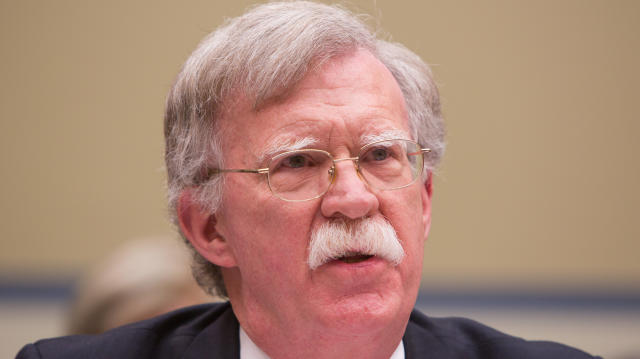
WASHINGTON — John Bolton, who President Donald Trump said on Thursday will replace H.R. McMaster as his national security adviser on April 9, is a polarizing pick, even by Trump administration standards.
Bolton is a notoriously hawkish former United Nations ambassador whose views don’t even align with the isolationist foreign policy platform on which Trump campaigned ― although it is difficult to tell what the president actually believes.
Bolton has had Trump’s ear, both as an informal adviser and as a commentator on Fox News, for a while. As a presidential candidate, Trump called Bolton “a tough cookie [who] knows what he’s talking about” (although the president apparently is not a fan of his mustache).
Here is a brief history of the new national security adviser’s career in foreign policy:
Bolton fiercely advocated for the Iraq War and promoted the false justification for it.
While serving as a top State Department official under President George W. Bush, Bolton was a chief promulgator of the administration’s justification for the Iraq War: that U.S. intelligence showed evidence of Iraq possessing weapons of mass destruction. Famously, this claim later turned out to be false.
But Bolton continued to insist that he was right in calling for war, even years later.
“I still think the decision to overthrow Saddam [Hussein] was correct,” he told the Washington Examiner in 2015. “I think decisions made after that decision were wrong, although I think the worst decision made after that was the 2011 decision to withdraw U.S. and coalition forces. The people who say, ‘Oh, things would have been much better if you didn’t overthrow Saddam,’ miss the point that today’s Middle East does not flow totally and unchangeably from the decision to overthrow Saddam alone.”
“You can’t assume if he had stayed in power, sweetness and light would prevail in the Middle East today,” he added.
He has called for bombing Iran and North Korea.
This does not bode well for diplomatic efforts, such as Trump’s apparent plan to meet with North Korean leader Kim Jong Un. In fact, Bolton said on Fox News earlier this month that he predicts the meeting will fail ― which he suggested would likely lead to military action.
And last month, Bolton made a strong case for a strike on North Korea. In an op-ed published in The Wall Street Journal titled “The Legal Case For Striking North Korea First,” he argued there were no legal reasons against a pre-emptive strike by the U.S.:
The threat is imminent, and the case against pre-emption rests on the misinterpretation of a standard that derives from prenuclear, pre-ballistic-missile times. Given the gaps in U.S. intelligence about North Korea, we should not wait until the very last minute. That would risk striking after the North has deliverable nuclear weapons, a much more dangerous situation
Bolton also intensely opposes the Iranian nuclear deal.
He damaged the United States’ foreign policy reputation while serving as the ambassador to the U.N.
Bolton has a history of speaking about international organizations with derision. While at the U.N., Bolton criticized it as “a twilight zone.” His extreme views and brash manner alienated many U.S. allies.
He has aligned himself with anti-Muslim hate groups.
Between his work at the conservative American Enterprise Institute, commentating on Fox News, and writing op-ed columns for right-leaning publications, Bolton has promoted Islamophobic conspiracy theories and supported anti-Islam organizations that have appeared on the Southern Poverty Law Center’s list of hate groups.
He joked that former President Barack Obama was a Muslim.
While speaking at an event for one such hate group, Bolton joked about Obama being Muslim. Luckily for him, his new boss launched his political career by spearheading the birther movement.

No comments:
Post a Comment